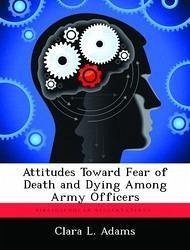The attitudes toward fear of death and dying among Army officers are of military importance because of their potential influence upon abilities to cope with the responsibilities of leadership. Previous studies have indicated that fears in of dying are realities for soldiers, and that they are managed in a variety of ways in combat situations. Further, it is probable that officers may have fears and coping methods depending upon an infinite number of influencing factors. This study sought to determine if there were differences in the expressed attitudes of Army aviators and combat officers. It was hypothesized that aviators would express less fear of death and dying than the combat officers, and that the rationale for the difference was a difference in training. Investigation revealed that there was a tendency for aviators to express less fear of death and dying than combat officers. However, the speculation that differences were based on training was not supported. It was found that there are other factors such as age, experience, religion, and education which may influence fears and fear management. Analysis of the data raised many questions that were beyond the scope of this study. However, the questions emphasize the urgent need for further research of the topic.
Hinweis: Dieser Artikel kann nur an eine deutsche Lieferadresse ausgeliefert werden.
Hinweis: Dieser Artikel kann nur an eine deutsche Lieferadresse ausgeliefert werden.








